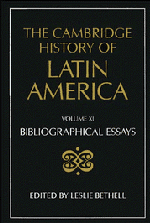Book contents
- Frontmatter
- I THE INDIGENOUS PEOPLES OF MIDDLE AND SOUTH AMERICA ON THE EVE OF THE CONQUEST
- II COLONIAL SPANISH AMERICA
- III COLONIAL BRAZIL
- IV THE INDEPENDENCE OF LATIN AMERICA
- V LATIN AMERICA: ECONOMY, SOCIETY, POLITICS, c. 1820 TO c. 1870
- VI LATIN AMERICA: ECONOMY, SOCIETY, POLITICS, c. 1870 to 1930
- 1 Latin America and the international economy, 1870–1914
- 2 Latin America and the international economy, 1914–1929
- 3 Population
- 4 Rural Spanish America
- 5 The growth of cities
- 6 Industry
- 7 The urban working class and early labour movements
- 8 The Catholic church
- 9 Mexico: Restored republic and Porfiriato, 1867–1910
- 10 The Mexican Revolution, 1910–1920
- 11 Mexico: Revolution and reconstruction in the 1920s
- 12 Central America
- 13 Cuba
- 14 Puerto Rico
- 15 The Dominican Republic
- 16 Haiti
- 17 Argentina: Economy, 1870–1914
- 18 Argentina: Society and politics, 1880–1916
- 19 Argentina, 1914–1930
- 20 Uruguay
- 21 Paraguay
- 22 Chile
- 23 Bolivia
- 24 Peru
- 25 Colombia
- 26 Ecuador
- 27 Venezuela
- 28 Brazil: Economy
- 29 Brazil: Society and politics, 1870–1889
- 30 Brazil: Society and politics, 1889–1930
- VII LATIN AMERICA: ECONOMY, SOCIETY, POLITICS, 1930 to c. 1990
- VIII IDEAS IN LATIN AMERICA SINCE INDEPENDENCE
- IX LATIN AMERICAN CULTURE SINCE INDEPENDENCE
- X THE INTERNATIONAL RELATIONS OF LATIN AMERICA SINCE INDEPENDENCE
- THE CAMBRIDGE HISTORY OF LATIN AMERICA
4 - Rural Spanish America
from VI - LATIN AMERICA: ECONOMY, SOCIETY, POLITICS, c. 1870 to 1930
Published online by Cambridge University Press: 28 March 2008
- Frontmatter
- I THE INDIGENOUS PEOPLES OF MIDDLE AND SOUTH AMERICA ON THE EVE OF THE CONQUEST
- II COLONIAL SPANISH AMERICA
- III COLONIAL BRAZIL
- IV THE INDEPENDENCE OF LATIN AMERICA
- V LATIN AMERICA: ECONOMY, SOCIETY, POLITICS, c. 1820 TO c. 1870
- VI LATIN AMERICA: ECONOMY, SOCIETY, POLITICS, c. 1870 to 1930
- 1 Latin America and the international economy, 1870–1914
- 2 Latin America and the international economy, 1914–1929
- 3 Population
- 4 Rural Spanish America
- 5 The growth of cities
- 6 Industry
- 7 The urban working class and early labour movements
- 8 The Catholic church
- 9 Mexico: Restored republic and Porfiriato, 1867–1910
- 10 The Mexican Revolution, 1910–1920
- 11 Mexico: Revolution and reconstruction in the 1920s
- 12 Central America
- 13 Cuba
- 14 Puerto Rico
- 15 The Dominican Republic
- 16 Haiti
- 17 Argentina: Economy, 1870–1914
- 18 Argentina: Society and politics, 1880–1916
- 19 Argentina, 1914–1930
- 20 Uruguay
- 21 Paraguay
- 22 Chile
- 23 Bolivia
- 24 Peru
- 25 Colombia
- 26 Ecuador
- 27 Venezuela
- 28 Brazil: Economy
- 29 Brazil: Society and politics, 1870–1889
- 30 Brazil: Society and politics, 1889–1930
- VII LATIN AMERICA: ECONOMY, SOCIETY, POLITICS, 1930 to c. 1990
- VIII IDEAS IN LATIN AMERICA SINCE INDEPENDENCE
- IX LATIN AMERICAN CULTURE SINCE INDEPENDENCE
- X THE INTERNATIONAL RELATIONS OF LATIN AMERICA SINCE INDEPENDENCE
- THE CAMBRIDGE HISTORY OF LATIN AMERICA
Summary
The study of Spanish American rural history, virtually ignored after a short burst of work in the 1930s, expanded impressively from the 1960s. This was due, in the first instance, to an enthusiasm for the process of modernization and later to laying bare the roots and mechanisms of dependency. Then, as money for field research dried up, there was a certain lull in foreign scholarship, while at the same time a new generation of Latin Americans, many of them trained abroad, brought renewed energy and subtlety to the field. The colonial epoch, from the sixteenth to the eighteenth centuries, has attracted the most attention and frequently the best scholars. The post–Second World War period became the scene of intense work by anthropologists, economists and sociologists as well as historians inspired in part by the interest in agrarian reform and peasant movements. In between, the understanding of nineteenth- and early-twentieth-century rural history improves but remains relatively undeveloped; it is, however, now on a sufficiently firm footing to permit discussion.
Very few scholars, undoubtedly humbled by the formidable variety and discontinuity of Latin America, have attempted broad, comparative analyses of rural history. Although not of course limited to rural history, Roberto Cortes Conde and Stanley Stein (eds.), Latin America: A Guide to Economic History 1830–1930 (Berkeley and Los Angeles, 1977) has excellent annotated bibliographies on several countries together with invariably perceptive interpretative essays by a series of distinguished academics. Jeffrey M. Paige, Agrarian Revolution: Social Movements and Export Agriculture in the Underdeveloped World (New York, 1975) includes discussion of Latin America; David Goodman and Michael Redclift, From Peasant to Proletarian: Capitalist Development and Agrarian Transitions (New York, 1982) has case studies of Mexico and Brazil within a broad discussion of theory; and Alain de Janvry, The Agrarian Question and Reformism in Latin America (Baltimore, 1981) focusses on recent years but raises wide-ranging historical questions.
- Type
- Chapter
- Information
- The Cambridge History of Latin America , pp. 336 - 341Publisher: Cambridge University PressPrint publication year: 1995
- 1
- Cited by

